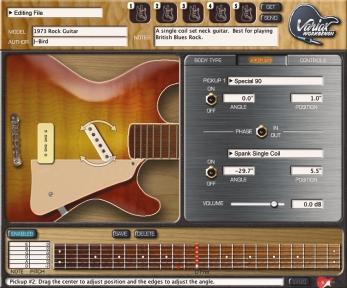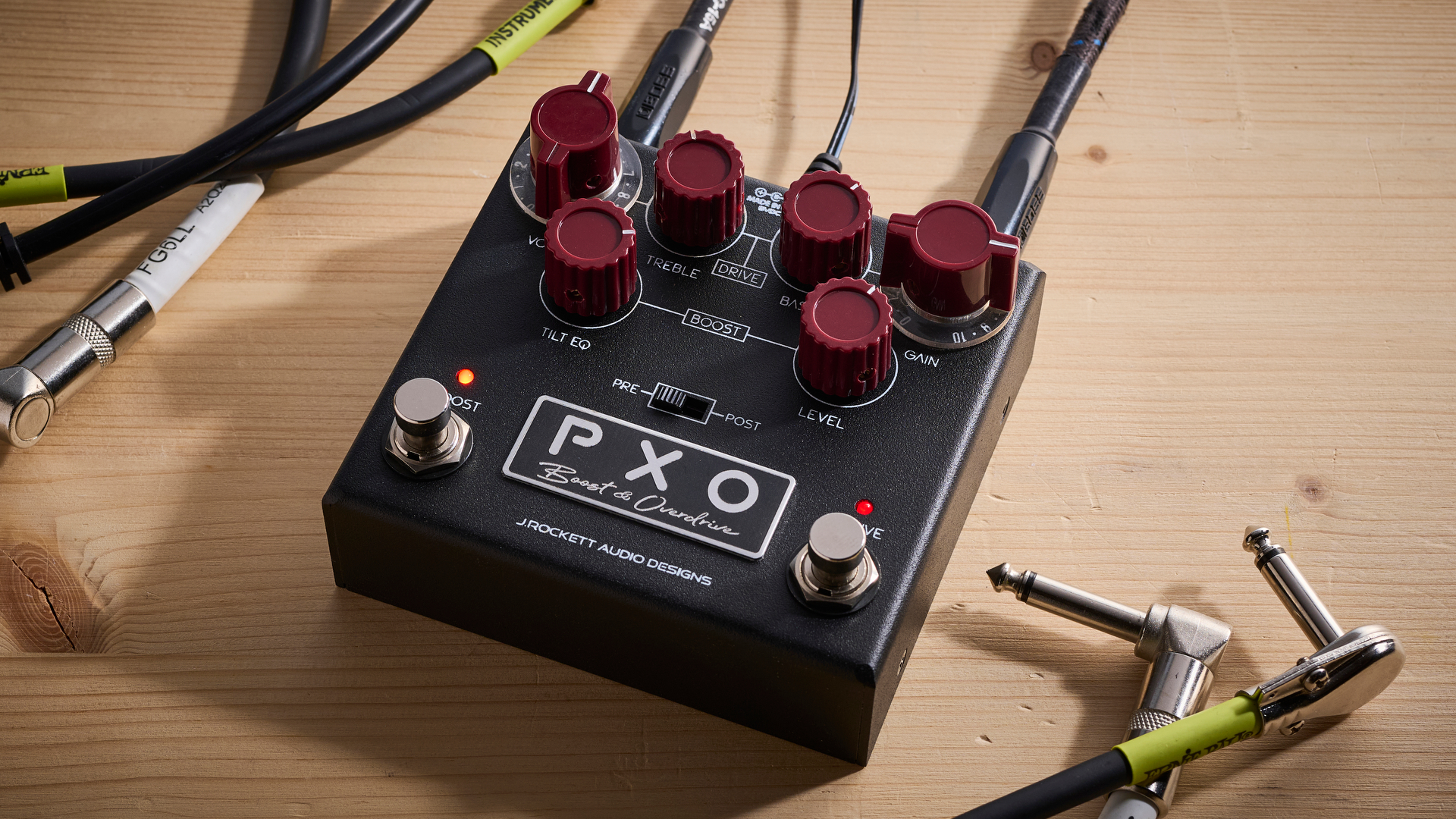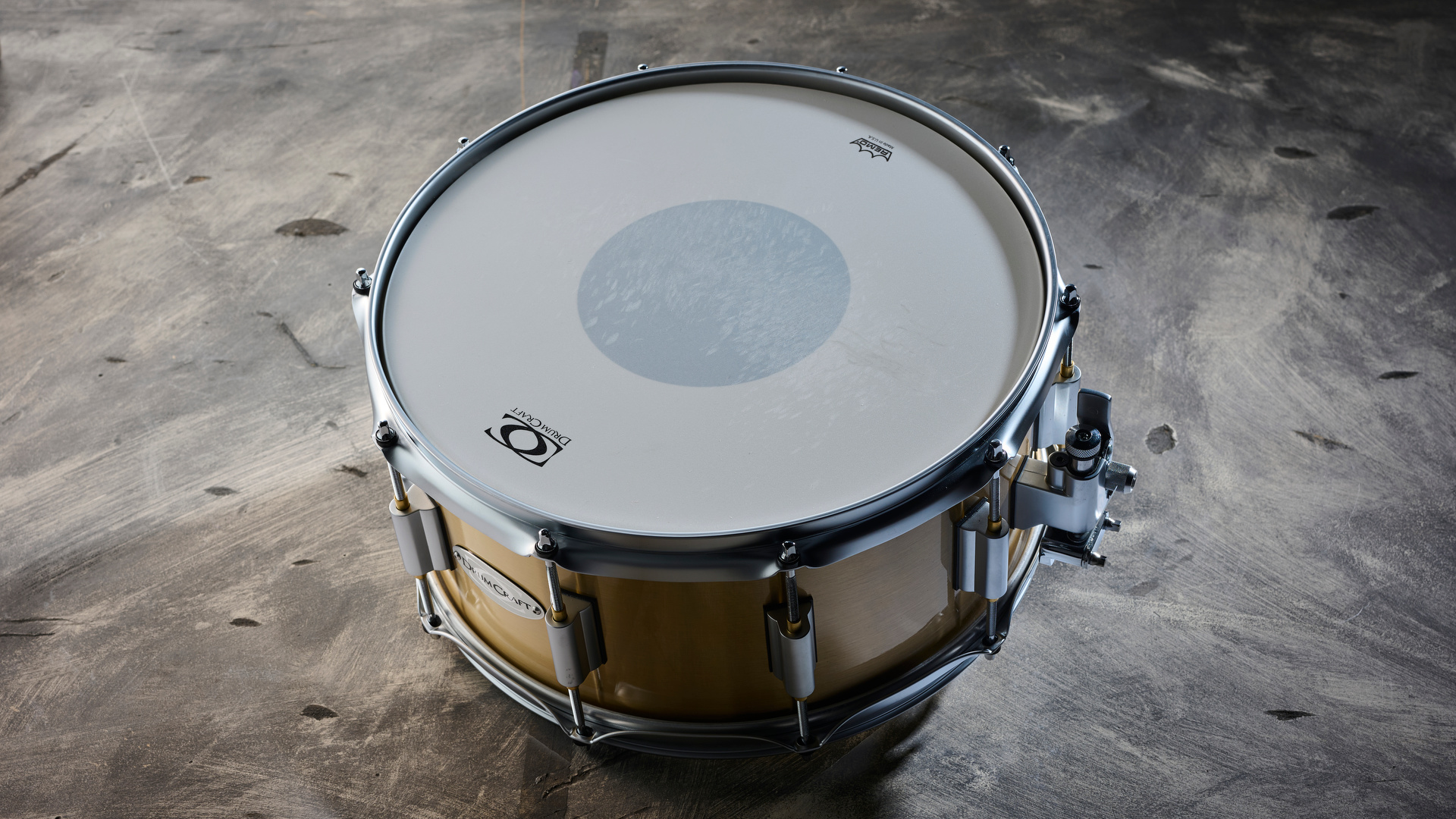MusicRadar Verdict
Immense fun, incredibly powerful, both graphically and audibly, and a synch to use - all at an amazing price.
Pros
- +
The most (legal) fun we’ve had for ages and it’s really easy to use.
Cons
- -
At this price, nothing.
MusicRadar's got your back
This is simply a software programme that allows you to customise your Variax. It is straightforward to use and, aside from downloading a firmware update so older 500 and 700 Variaxes can talk to Workbench, installation should be straightforward.
You plug Variax into your guitar amp, plug the supplied RJ-45 cable from Variax into Workbench´s USB interface and plug that into your computer´s USB socket. There are basically four areas of customisation: body type, pickups, controls and tuning.
To illustrate how it works let´s select the Spank bank - the classic five sounds of a modelled 1959 Fender Stratocaster. As soon as you select a sound on the five-way, Workbench recognises which it is and a graphic representation of the model, adapted to the Variax-shape, appears to the left of your screen. On the right you get a simpler true outline and, of course, the drop down menu to select any one of the 28 modelled bodies - basically all the instruments that are on your Variax. So you could for example change the Strat´s body for an ES-175 and you´ll immediately hear a change to the sound.
Next we move to pickups. Here the right-hand graphic shows pickup on/off switches, a box to select one of the 32 different pickups (including neck, bridge and middle options), angle and position of each pickup, phase (in/out), series/parallel linkage, and both overall and independent level for each pickup. A maximum of two pickups can be used for each sound - you can´t have all the Strat´s three pickups on at once and you can´t add, let´s say, a fourth pickup to your Strat. As you select a new pickup it will appear on the left-hand graphic on the body type you´ve selected and, like the body type, the sound change is immediate.
Controls
Controls allows us to alter the volume and tone knob resistance and taper, the tone control capacitor value and - if you want - the tone control position: instantly recallable ‘woman´ tone. This section is, admittedly, a little on the anorak side but you´ll be surprised what a difference these values make.
Finally, and much more audibly noticeable, is the tuning section. Along the bottom of the display is a graphic of a fretboard - in the centre is the top nut so you can alter, up or down, each string´s audible pitch by an octave.
As with Variax Acoustic you´re not changing the actual pitch of the string, but what you hear coming out of your amp has the relevant pitch-shifting applied. There are eight common open and altered tuning presets but you can create your own too. Alternatively, by changing the pitch of all the strings by the same interval you create a virtual capo. You play in standard position but what you hear from your amp is altered.
So our Strat now has an ES-175 body, a P-90 at bridge and a lipstick tube placed directly next to it. They´re wired in series. We´ve mucked around with the volume and tone controls and, oh yes, it´s tuned to DADGAD. Happy? Save it either directly on to Variax or begin creating your own library of ‘Frankensteins´ for future use. Each of the Variax´s 60 slots can be filled with custom tones, although you can create even more (as many as your hard disk will allow) and just load them on to Variax when you need them.
Aside from a couple of bugs in the beta-test software we were evaluating that won´t be on the final version, Workbench is a revelation. Not only is it immense fun but, both audibly and graphically, it´s incredibly powerful. Need a bit more or less output from your back pickup? Change its volume. You want to add a PAF humbucker to you bridge position Strat? Click on it. It´s a little brightfiDrag it towards the neck a little or angle it. We had to stop having fun to meet our deadline but there are hours of tinkering to be had here.
You can only alter the tuning on the acoustic models and the tone (mic position), and you can´t alter the tuning of the 12-strings (although you can alter the mix between the standard and octave strings, as well as the amount of detuning, which gives less or more chorusing effect). You can even change, for example, the tunings of the five sounds within a bank so they´re each tuned to an open chord - you could then strum away and to change chord you just use the five-way switch! Mad.
Power
As we´ve said before, if you just use your ol´ Strat with your ol´ ‘Plexi´ you won´t need Variax or Workbench. But if you need more guitar sounds than your current instrument allows, and you can´t be bothered with the expense or hassle of owning and transporting a number of guitars (electric and acoustic), you´ll immediately begin to see the potential. Variax 300 is a low-end guitar for sure, but the available power is unmatched by anything else (apart from other Variaxes, of course). Does it sound different to Variax 500 or 700? Does a Squier Strat sound different to a Mex Strat or an American Series? Yes, they´re still all Strats but there´s a subtle difference. If you can afford it go for the 700 but the 300 has the same sounds, albeit a little lighter and slightly less rich.
Workbench is simply the most fun we´ve had for ages. An endless amount of custom guitars can be created with hybrid body styles, pickups, electrics and tunings. It´s devilishly easy to use yet, for the performing or recording musician, takes an already wonderful concept into another dimension allowing you to create things that just aren´t possible even from the best custom shop in the world. All this for £419 - not to mention connectivity with products like Vetta II and PODxt Live (which as you change amp sound will automatically adjust your guitar sound for you) - is simply staggering. Unless you are a seriously blinkered musician we really can´t see why you couldn´t find a lot of use for these products. The revolution? It´s already here.
MusicRadar is the number 1 website for music makers of all kinds, be they guitarists, drummers, keyboard players, djs or producers...
GEAR: We help musicians find the best gear with top-ranking gear round-ups and high- quality, authoritative reviews by a wide team of highly experienced experts.
TIPS: We also provide tuition, from bite-sized tips to advanced work-outs and guidance from recognised musicians and stars.
STARS: We talk to musicians and stars about their creative processes, and the nuts and bolts of their gear and technique. We give fans an insight into the actual craft of music making that no other music website can.
Teenage Engineering drops knockout update for its EP-133 K.O. II sampler, bringing much-requested features like resampling, song mode and increased polyphony
“I love this version better than mine!!”: Sheryl Crow sings Kelly Clarkson’s praises after watching her cover her breakthrough ‘90s hit
“I’m drawn to melody and drama - AOR and yacht rock”: Tobias Forge says the new Ghost album combines smooth ’80s sounds with Black Sabbath-inspired lyrics











